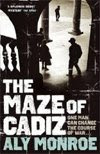On Sunday mornings I zip through the online press, British, Spanish and American, pausing, of course, if an item catches my eye.
Sometimes this is a catch-up – I had previously missed, for example, that Patrick Leigh Fermor had died.
And then there are my regulars, writers I check up on to see what they are saying each week. One of these is Javier Marías in El Pais. Given the lead time – the article is in the supplement – there can be an air of relatively short term memory recovery about the piece.
On June 11 Marías tackled the respective briefings and leaks in an upcoming legal case involving a recent head of the IMF. His title, La Historia Doblemente Increible, hardly needs translation. That’s doubly and that’s incredible.
I should make it clear that Marías does not prejudge, does not take one side over the other in the conflicting stories , though his vocabulary choice when writing of the accused is not sympathetic to the man.
What he does bring is a novelist’s eye to the stories being offered and points out how utterly unconvincing they both are.
There is Coleridge’s famous line about ‘the suspension of disbelief’. I’d guess that Marías is talking of the reports as such sensationally bad fiction that it is impossible to suspend any disbelief. An editor would be saying ‘Doesn’t add up’ or ‘Makes no sense’ – though here we are talking of a future legal reality and judgement, and their preparatory public spin.
One of the reasons I like his books is because Javier Marías brings such respect and care to the craft of fiction. Good fiction brings a degree of inner logic and a convincing measure of observation and perception to an invention we can recognize or, if very novel, learn to recognize.
The only physical newspaper I now read is the weekend edition of the Financial Times. Last weekend Jan Dalley interviewed Philip Roth and asked him about ‘the limits of fiction’. Mr Roth was not drawn.







